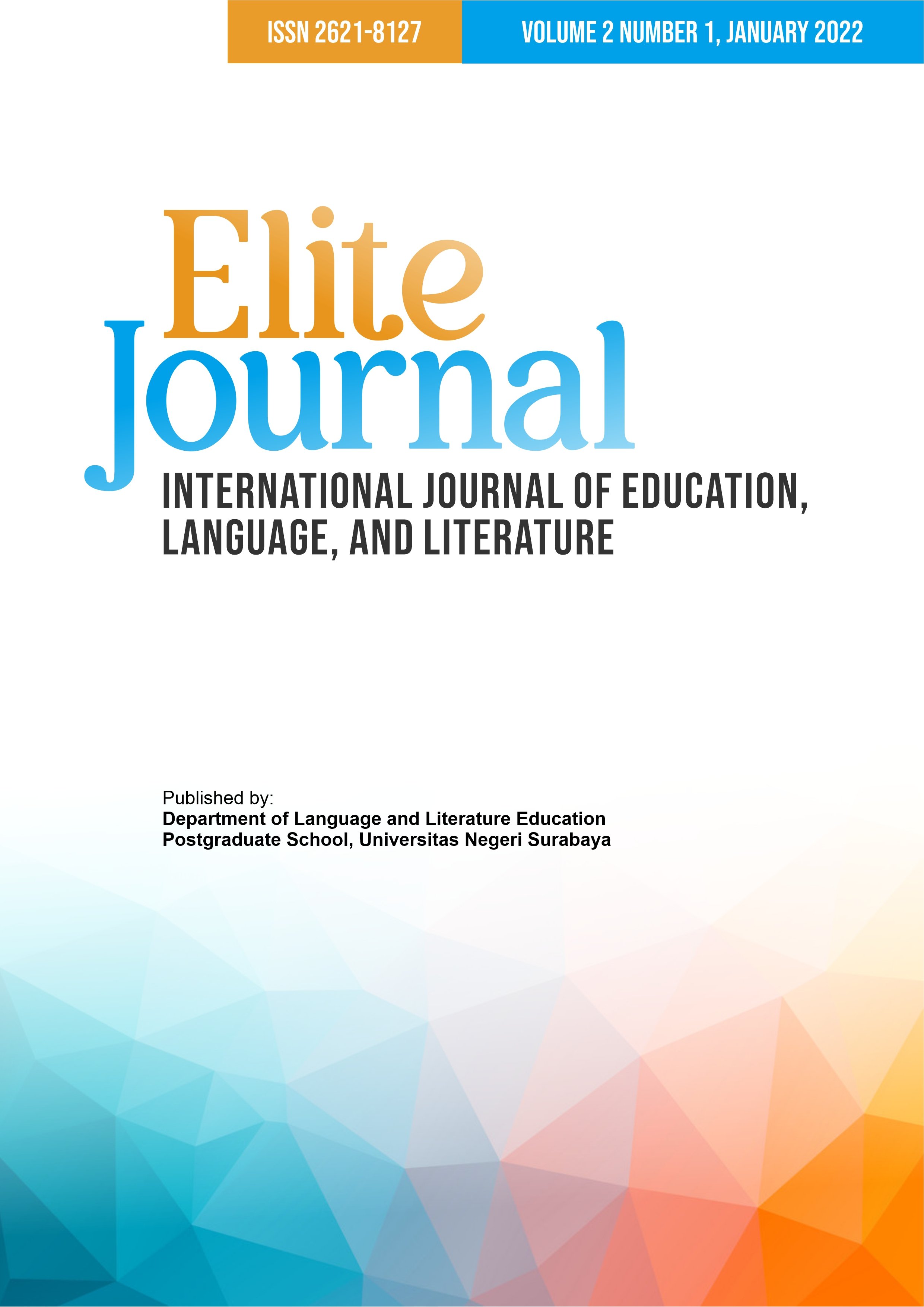SELF-ACTUALIZATION IN JANE EYRE’S MAIN CHARACTER : A FEMINISM STUDY
DOI:
https://doi.org/10.26740/elitejournal.v2n1.p25-39Keywords:
feminism, novel, self-actualizationAbstract
This study focuses on Charles Fourier's feminism and Maslow's self-actualization. The writers concentrate on Maslow's self-actualization theory's self-esteem prerequisite and five personality traits in this study. This study is qualitative research, and it employs descriptive-analytic methods. This study examines Jane Eyre's utterances and actions to uncover her personality traits in the novel Jane Eyre, to analyze Jane Eyre's inner feminist thinking. It is worth emphasizing that this research uses feminism as the theoretical background to explain the personality characteristics of Jane Eyre's inherent self-actualization. A conclusion was reached at the end of the discussion. Jane Eyre satisfies the need for self-esteem, has a self-esteem personality, and expresses the five self-actualization personality traits. Five of them are perceiving reality, accepting the self and others, being problem-centrist, independent, resisting, and criticizing the existing social culture. This research serves as a reference for studying feminist thought and is limited to looking at its thoughts through inner personality traits, suitable for providing references for people who want to know how to achieve self-actualization in society.
References
A.P, A. A. (2017). Foreign languages invictorianera ??????????? ????? ? ????????????? ?????. Retrieved from https://cyberleninka.ru/article/n/inostrannye-yazyki-v-viktorianskuyu-epohu/viewer
Afriani, D. (2020). Freedom of choice: Are Indonesian women caught impolicy trap? Retrieved from https://www.thejakartapost.com/news/2019/12/30/more-indonesian-women-in-labor-market-fewer-in-politics-gender-gap-report.html.
Armstrong, E. (2020). Marxist and socialist feminism. study of women and gender: Faculty Publications.
Barrett, M. (1980). Women's oppression today problems in Marxist feminist analysis. Verso Trade.
Crossman, A. (2019). Feminist theory in sociology. Retrieved from https://www.thoughtco.com/feminist-theory-3026624
Devina, H. (2020). More Indonesian women in labor market, fewer in politics: Gender Gap Report. Retrieved from https://www.thejakartapost.com/news/2019/12/30/more-indonesian-women-in-labor-market-fewer-in-politics-gender-gap-report.html.
Duanne, S. (1977). Growth psychology: model of healthy personality. D.N.Van Nostand.
Emma, W. (1819). Plan for improving female education. Ohio University Press.
Farozin, M., & Fathiyah, K. N. (2004). Pemahaman tingkah laku. Jakarta: PT. Rineka Cipta.
Ignatius. (2002). An overview of feminism in the victorian period. American Research Journal of English and Literature, 3(1).
Johanna, O. (2016). Feminist experiences: foucauldian and phenomenalgicalinvestigations. Northwestern University Press.
Julia, K. (1980). Desire in Language: A semiotic approach to literature and art (L. S. R. T. Gora, A. Jardine, & L. S. Roudiez (eds.)). European Perspectives.
Karen, W. (2008). A classification of feminist theories. Retrieved from https://www.erudit.org/en/journals/ateliers/2008-v3-n2-ateliers03570/1044593ar.pdf
Kaschak, E. (1992). The mattering map: Multiplicity, metaphor and morphigin contextual. Retrieved from https://www.tandfonline.com/doi/full/10.1080/02703149.2010.532688
Leavy, R. L., & Adams, E. M. (1986). Feminism as a correlate of self-esteem, self-acceptance and social support among lesbians. Ohio Wesleyan University.
Maslow, A. H. (1954). Motivation. Personality N Ew York: Harper & Row Publishers Inc.
Naomi, S. (1993). engendering: constructions of knowledge, authority, and privilege. Routledge.
Noell, M. (2003). Julia Kristeva. Routledge.
Perera, A. (2020). Self-Actualization. Retrieved from https://www.simplypsychology.org/self-actualization.html
Priyatna, A. (2016). Gender bias and Indonesian education system. Retrieved from http://sdgcenter.unpad.ac.id/gender-bias-and-indonesian-education-system/
Tong, R. (1989). Feminism Thought. Westview Press.
Zhang, L. (1999). Review of contemporary american feminist trend of thought. American Institute of Chinese Academy of Social Sciences.
Downloads
Published
How to Cite
Issue
Section
License
Copyright (c) 2021 LIN JIN

This work is licensed under a Creative Commons Attribution 4.0 International License.
 Abstract views: 1132
,
Abstract views: 1132
, PDF Downloads: 1013
PDF Downloads: 1013





